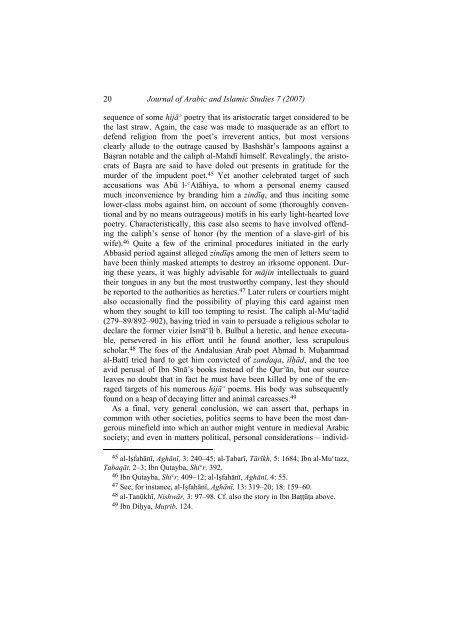Freedom of Expression and Censorship in Medieval Arabic Literature
Freedom of Expression and Censorship in Medieval Arabic Literature
Freedom of Expression and Censorship in Medieval Arabic Literature
Create successful ePaper yourself
Turn your PDF publications into a flip-book with our unique Google optimized e-Paper software.
20<br />
Journal <strong>of</strong> <strong>Arabic</strong> <strong>and</strong> Islamic Studies 7 (2007)<br />
sequence <strong>of</strong> some hijāʾ poetry that its aristocratic target considered to be<br />
the last straw. Aga<strong>in</strong>, the case was made to masquerade as an effort to<br />
defend religion from the poet’s irreverent antics, but most versions<br />
clearly allude to the outrage caused by Bashshār’s lampoons aga<strong>in</strong>st a<br />
Baṣran notable <strong>and</strong> the caliph al-Mahdī himself. Reveal<strong>in</strong>gly, the aristocrats<br />
<strong>of</strong> Baṣra are said to have doled out presents <strong>in</strong> gratitude for the<br />
murder <strong>of</strong> the impudent poet. 45 Yet another celebrated target <strong>of</strong> such<br />
accusations was Abū l-ʿAtāhiya, to whom a personal enemy caused<br />
much <strong>in</strong>convenience by br<strong>and</strong><strong>in</strong>g him a z<strong>in</strong>dīq, <strong>and</strong> thus <strong>in</strong>cit<strong>in</strong>g some<br />
lower-class mobs aga<strong>in</strong>st him, on account <strong>of</strong> some (thoroughly conventional<br />
<strong>and</strong> by no means outrageous) motifs <strong>in</strong> his early light-hearted love<br />
poetry. Characteristically, this case also seems to have <strong>in</strong>volved <strong>of</strong>fend<strong>in</strong>g<br />
the caliph’s sense <strong>of</strong> honor (by the mention <strong>of</strong> a slave-girl <strong>of</strong> his<br />
wife). 46 Quite a few <strong>of</strong> the crim<strong>in</strong>al procedures <strong>in</strong>itiated <strong>in</strong> the early<br />
Abbasid period aga<strong>in</strong>st alleged z<strong>in</strong>dīqs among the men <strong>of</strong> letters seem to<br />
have been th<strong>in</strong>ly masked attempts to destroy an irksome opponent. Dur<strong>in</strong>g<br />
these years, it was highly advisable for māj<strong>in</strong> <strong>in</strong>tellectuals to guard<br />
their tongues <strong>in</strong> any but the most trustworthy company, lest they should<br />
be reported to the authorities as heretics. 47 Later rulers or courtiers might<br />
also occasionally f<strong>in</strong>d the possibility <strong>of</strong> play<strong>in</strong>g this card aga<strong>in</strong>st men<br />
whom they sought to kill too tempt<strong>in</strong>g to resist. The caliph al-Muʿtaḍid<br />
(279–89/892–902), hav<strong>in</strong>g tried <strong>in</strong> va<strong>in</strong> to persuade a religious scholar to<br />
declare the former vizier Ismāʿīl b. Bulbul a heretic, <strong>and</strong> hence executable,<br />
persevered <strong>in</strong> his effort until he found another, less scrupulous<br />
scholar. 48 The foes <strong>of</strong> the Andalusian Arab poet Aḥmad b. Muḥammad<br />
al-Battī tried hard to get him convicted <strong>of</strong> z<strong>and</strong>aqa, ilḥād, <strong>and</strong> the too<br />
avid perusal <strong>of</strong> Ibn Sīnā’s books <strong>in</strong>stead <strong>of</strong> the Qurʾān, but our source<br />
leaves no doubt that <strong>in</strong> fact he must have been killed by one <strong>of</strong> the enraged<br />
targets <strong>of</strong> his numerous hijāʾ poems. His body was subsequently<br />
found on a heap <strong>of</strong> decay<strong>in</strong>g litter <strong>and</strong> animal carcasses. 49<br />
As a f<strong>in</strong>al, very general conclusion, we can assert that, perhaps <strong>in</strong><br />
common with other societies, politics seems to have been the most dangerous<br />
m<strong>in</strong>efield <strong>in</strong>to which an author might venture <strong>in</strong> medieval <strong>Arabic</strong><br />
society; <strong>and</strong> even <strong>in</strong> matters political, personal considerations – <strong>in</strong>divid-<br />
45 al-Iṣfahānī, Aghānī, 3: 240–45; al-Ṭabarī, Tārīkh, 5: 1684; Ibn al-Muʿtazz,<br />
Ṭabaqāt, 2–3; Ibn Qutayba, Shiʿr, 392.<br />
46 Ibn Qutayba, Shiʿr, 409–12; al-Iṣfahānī, Aghānī, 4: 55.<br />
47 See, for <strong>in</strong>stance, al-Iṣfahānī, Aghānī, 13: 319–20; 18: 159–60.<br />
48 al-Tanūkhī, Nishwār, 3: 97–98. Cf. also the story <strong>in</strong> Ibn Baṭṭūṭa above.<br />
49 Ibn Diḥya, Muṭrib, 124.

















